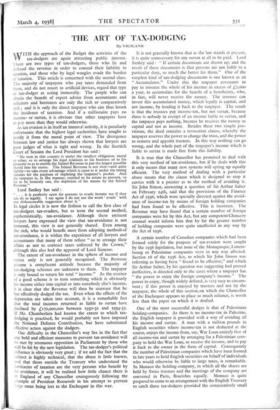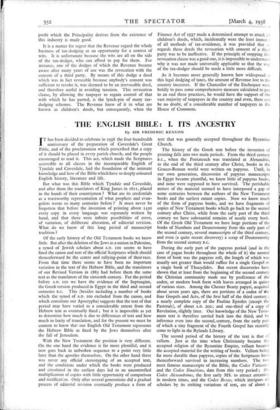THE ART OF TAX-DODGING
By VIGILANS
WITH the approach of the Budget the activities of the tax-dodgers are again attracting public interest.
'1 here are two types of tax-dodgers, those who lie and defraud the revenue in order to conceal their liability to taxation, and those who by legal wangles evade the burden of taxation. This article is concerned with the second class. The majority of taxpayers who pay taxes demanded from them, and do not resort to artificial devices, regard that type of tax-dodger as acting immorally. The people who can obtain the benefit of expert advice from accountants and solicitors and barristers are only the rich or comparatively rich ; and it is only the direct taxpayer who can thus lessen the incidence of taxation. And if a millionaire pays no income- or surtax, it is obvious that other taxpayers have to pay more than they would otherwise.
As tax evasion is in itself an immoral activity, it is peculiarly unfortunate that the highest legal authorities have sought to justify it from the moral point of view. The divergence between law and justice has always shown that lawyers are poor judges of what is right and wrong. In the Scottish Court of Session the Lord President has said : " No man in this country is under the smallest obligation, moral or other, so to arrange his legal relations to his business or to his property so as to enable the Inland Revenue to put the largest possible shovel into his stores. The Inland Revenue is not slow—and quite rightly—to take every advantage which is open to it under the taxing statutes for the purpose of depleting the taxpayer's pocket. And the taxpayer is, in like manner, entitled to be astute to prevent, so far as he honestly can, the depletion of his means by the Inland Revenue."
Lord Sankey has said : " . . . it is perfectly open for persons to evade income tax if they can do so legally. I say again I do not use the word ' evade ' with any dishonourable suggestion about it."
In legal circles it is now the fashion to call the first class of tax-dodgers tax-evaders, but to term the second method, euphemistically, tax-avoidance. Although these eminent lawyers have expressed the view that tax-avoidance is not immoral, this view is not generally shared. Even among the rich, who would benefit most from adopting methods of tax-avoidance, it is within the experience of all lawyers and accountants that many of them refuse " so to arrange their affairs as not to contract taxes enforced by the Crown," although this also had the approval of Lord Sumner.
The extent of tax-avoidance in the sphere of income and surtax only is not generally recognised. The Revenue assume a complacent attitude because the majority of tax-dodging schemes are unknown to them. The taxpayer is only bound to return his total " income." As the essence of a good scheme is to turn something which is obviously his income either into capital or into somebody else's income, it is clear that the Revenue will then be unaware that he hai effectively dodged the tax. Even when the effects of the depression are taken into account, it is a remarkable fact that the total incomes returned as liable to surtax have declined by Luo,000,000 between 1930-31 and 1934-35. If Mr. Chamberlain had known the extent to which tax- dodging is practised, he would probably not have imposed the National Defence Contribution, but have substituted effective action against the dodgers.
One difficulty in the Chancellor's way lies in the fact that any bold and efficient measures to prevent tax-avoidance will be met by strenuous opposition in Parliament by those who will be hit by the new legislation. The tax-dodger's political influence is obviously very great ; if we add the fact that the subject is highly technical, that the abuse is little known, and that those outside the Treasury who understand the intricacies of taxation are the very persons who benefit by its avoidance, it will be realised how little chance there is in England of any 'Chancellor courageously following the example of President Roosevelt in his attempt to prevent large sums being lost to the Exchequer in this way. It is not generally known that as the law stands at present, it is quite unnecessary for any surtax at all to be paid. Lord Sankey said : " If certain documents are drawn up, and the result of these documents is that persons are not liable to a particular duty, so much the better for them." One of the simplest kind of tax-dodging documents is one known as an " Accumulator." Under this the taxpayer covenants to pay to trustees the whole of his income in excess of £2,000 a year, to accumulate for the benefit of a beneficiary, who, in fact, will never receive the money. The trustees can invest this accumulated money, which legally is capital, and not income, by lending it back to the taxpayer. The result is that the trustees pay income-tax, but not surtax, because there is nobody in receipt of an income liable to surtax, and the taxpayer pays nothing, because he receives the money as capital and not as income. Besides these two simple pro- visions, the deed contains a revocation clause, whereby the taxpayer reserves the power to change the trust, and the power to remove and appoint trustees. In this way nothing can go wrong, and the whole part of the taxpayer's income which is liable to surtax is made free from this liability.
It is true that the Chancellor has promised to deal with this very method of tax-avoidance, but if he deals with this it only means that many new systems will spring up equally efficient. The very method of dealing with a particular abuse means that the clause which is designed to stop it carries with it a pointer as to the method of avoiding it. Sir John Simon, answering a question of Sir Arthur Salter on February 24th, said that the provisions of the Finance Act of 1936, which were specially directed against the avoid- ance of income-tax by means of foreign holding companies had been found to be effective. This is incorrect. The Revenue may have found that a certain number of foreign companies were hit by this Act, but any competent Chancery counsel would inform him that by far the greater number of holding companies were quite unaffected in any way by the Act of 1936.
A certain number of Canadian companies which had been formed solely for the purpose of tax-evasion were caught by the 1936 legislation, but none of the Monagasque, Luxem- bourg or Palestinian companies were in any way affected. Section 18 of the 1936 Act, to which Sir John Simon was referring as having been " found to be effective," and which Sir Arthur Salter, by his question was suggesting had proved ineffective, is directed only to the cases where a taxpayer has " the power to enjoy the foreign company's income." The power to enjoy, though widely defined, is very easy to circum- vent ; if this power is enjoyed by trustees and not by the taxpayer, the whole of this section, on which the Chancellor of the Exchequer appears to place so much reliance, is worth less than the paper on which it is drafted.
One of the most successful dodges is that of Palestinian holding-companies. As there is no income-tax in Palestine, the English taxpayer is provided with a way of avoiding all his income and surtax. A man with a million pounds in English securities where income-tax is not deducted at the source, enjoys the income from, say, War Loan entirely free of all income-tax and surtax by arranging for a Palestinian com- pany to hold the War Loan, to receive the income, and to pay it back to the owner in the form of capital. Consequently the number of Palestinian companies which have been formed in late years to hold English securities on behalf of individuals who would otherwise be liable to large taxes, is remarkable. In Monaco the holding-company, in which all the shares are held by Swiss trustees and the meetings of the company are convened in Paris, flourishes equally. Monaco is quite prepared to come to an arrangement with the English Treasury to catch these tax-dodgers provided the comparatively small profit which the Principality derives from the existence of this industry is made good.
It is a matter for regret that the Revenue regard the whole business of tax-dodging as an opportunity for a contest of wits. It is unfortunate because the wits are all on the side of the tax-dodger, who can afford to pay for them. For instance, one of the dodges of which the Revenue became aware after many years of use was the revocation with the consent of a third party. By means of this dodge a deed which was in fact revocable because anybody's consent was sufficient to revoke it, was deemed to be an irrevocable deed, and therefore useful in avoiding taxation. This revocation clause, by allowing the taxpayer to regain control of that with which he has• parted, is the lynch-pin of many tax- dodging schemes. The Revenue knew of it in what are known as children's deeds, but consequently, when the Finance Act of 1937 made a determined attempt to attack a'i children's deeds, which, incidentally were the least inmnor,-.°. of all methods of tax-avoidance, it was provided that as regards these deeds the revocation with consent of a thind party was to be ineffective. If the principle of stopping this revocation clause was a good one, it is impossible to understand why it was not made universally applicable so that the way of the tax-dodger should be made a little more difficult.
As it becomes more generally known how widespread is this legal dodging of taxes, the amount of Revenue lost to the country increases. If the Chancellor of the Exchequer were boldly to pass some comprehensive measure calculated to put to an end these practices, he would have the support of the vast majority of taxpayers in the country and even, there can be no doubt, of a considerable number of taxpayers in the House of Commons.







































































 Previous page
Previous page